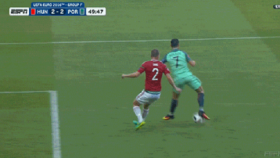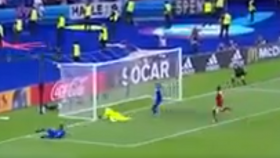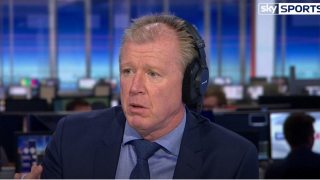Ask the average sports fan for a sport that dopes, and you’ll likely hear the same list: Baseball, cycling, weightlifting. Perhaps athletics might get a mention in an Olympics year or tennis might come up now with the issues around Maria Sharapova. Regardless, soccer is one sport that is kept so far away from these scandals, and it rarely ever gets a mention.
Yet, clubs in England have been put on the defense this past week over allegations that may change all that. According to the Sunday Times, Dr. Mark Bonar has been responsible for doling out steroids and HGH to at least a handful of players in the Premier League.
Predictably, the claims were shot down by the clubs. Chelsea, Arsenal and Leicester City all released statements saying there is no doping at their clubs … to their knowledge.
Perhaps these clubs are honestly above these allegations. And it must be said that these claims have not yet been substantiated, nor has any specific player been accused.
But, all the same, it is almost inconceivable that there is not at least a modest amount of doping taking place in the world’s most popular game, and if that is true, it’s even harder to believe it wouldn’t be taking place in the game’s biggest league.
The temptation would simply be too great, the money too tempting for every player, club and national side to remain above this. And it’s not just journalists who think so, it’s Arsenal’s own Arsene Wenger.
“Honestly, I don’t think we do enough [testing],” Wenger said in 2013. “It is very difficult for me to believe that you have 740 players at the World Cup and you come out with zero problems. Mathematically, that happens every time. But statistically, even for social drugs, it looks like we would do better to go deeper.”
That concern might signal that Arsenal at least does take this issue seriously, but is every club run by such conscientious managers?
Remember, this is a sport that is quickly becoming as well known for its corruption as for the quality of its entertainment. FIFA has been blown up by bad money changing hands. Sepp Blatter and Michel Platini have been ousted for it. And now, with the publishing of the Panama Papers, new President Gianni Infantino may be joining them.
As more is learned about FIFA’s dealings, it is becoming increasingly clear that just about every World Cup has been bought with briefcases of illegal fund.
And these problems are not just at the international level. In 2006, several top Italian teams, including Juventus and AC Milan, were caught bribing referees to get decisions to go their way. Considering how eager soccer has been to throw aside every rule, how can anyone doubt there is major doping taking place somewhere?
But, if this is the case, why don’t we ever hear about it? Partly, it is harder to catch than in some sports. Barry Bonds was demonstrably larger after he started using steroids, and his numbers became flagrantly more impressive. Soccer players, meanwhile, wouldn’t benefit from more bulk. Very likely, the greatest use for drugs would be improving and speeding up outcomes from injury. And when a favorite player makes a faster than expected return, no one wants to dig for a reason beyond dedication and luck.
Which is the main reason no one wants to look into this. Consider Peyton Manning, whose HGH scandal was largely dismissed by the media and fans alike. Nobody wanted to have their image of hard-working, humble, brilliant Manning destroyed by those allegations being true. No one wanted to know if that HGH was for his wife or for him. And besides, we rationalize, if it was for him, it was to recover from an injury, not to gain a strength advantage, which feels less unethical. So, better to leave it.
With organizational corruption and hero worship aplenty in soccer, it’s therefore not hard at all to understand how steroids could so easily stay out of the papers. But if Wenger’s math is right, and there’s anything to the Times’ story, that may not stay true for long.
After all, no one thought Sepp Blatter could be taken down until he was. And your favorite player may be next.
 Share
Share 











